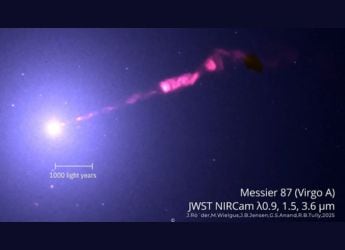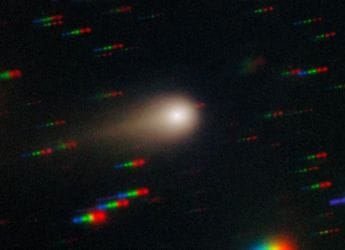- Home
- Science
- Science News
- Saturn’s Moon Enceladus Spouts Complex Organics That Could Hold Clues to Life
Saturn’s Moon Enceladus Spouts Complex Organics That Could Hold Clues to Life
Cassini data show Enceladus’ plumes contain complex organics from its subsurface ocean.

Photo Credit: NASA/JPL-Caltech/Space Science Institute/Lunar and Planetary Institute
Icy plumes on Enceladus’ surface release organic molecules into space, hinting at potential habitability
Saturn's icy moon Enceladus has been found to eject organic molecules from its geysers. Around twenty years after NASA's Cassini spacecraft first sampled the plumes. These molecules contain carbon, are part of chemical reactions that can form life's building blocks. The plumes, fed by a subsurface ocean beneath Enceladus' fractured surface. This expels water vapour into space, forming part of Saturn's E-ring. New analysis of archived Cassini data brings to light a few information that pristine ice grains in the plumes carry these organics directly from the ocean, untouched by radiation.
Cassini Data Confirms Enceladus' Ocean Shoots Organic Molecules That Could Support Life
According to a report in Nature Astronomy, a group of experts led by Nozair Khawaja at Freie Universität Berlin and the University of Stuttgart re-evaluated Cassini's Cosmic Dust Analyser data from 2008. Their study brings out that organic molecules in the ice grains match those found in the E-ring. It proves that they originate from Enceladus' ocean. In addition, the team also finds aliphatic and cyclic compounds, ethers, and potential nitrogen- and oxygen-bearing molecules.
Scientists' trust in the search for life beyond Earth – these findings seal the deal on Enceladus' status as a prime target. Nevertheless, radiation on the moon's surface can also create organics. Also, the direct plume measurements indicate that a subsurface ocean is chemically active.
Experts note that these molecules represent pieces of the puzzle along pathways that, on Earth. This drives to amino acids and other life-related compounds. Moreover, this discovery facilitates a remarkable insight into how icy moons may host prebiotic chemistry.
The proposed European Space Agency orbiter can leave no stone unturned by sampling Enceladus' ice directly to conclude whether its ocean supports the complex chemistry related to essential life.
For the latest tech news and reviews, follow Gadgets 360 on X, Facebook, WhatsApp, Threads and Google News. For the latest videos on gadgets and tech, subscribe to our YouTube channel. If you want to know everything about top influencers, follow our in-house Who'sThat360 on Instagram and YouTube.
Related Stories
- Samsung Galaxy Unpacked 2025
- ChatGPT
- Redmi Note 14 Pro+
- iPhone 16
- Apple Vision Pro
- Oneplus 12
- OnePlus Nord CE 3 Lite 5G
- iPhone 13
- Xiaomi 14 Pro
- Oppo Find N3
- Tecno Spark Go (2023)
- Realme V30
- Best Phones Under 25000
- Samsung Galaxy S24 Series
- Cryptocurrency
- iQoo 12
- Samsung Galaxy S24 Ultra
- Giottus
- Samsung Galaxy Z Flip 5
- Apple 'Scary Fast'
- Housefull 5
- GoPro Hero 12 Black Review
- Invincible Season 2
- JioGlass
- HD Ready TV
- Laptop Under 50000
- Smartwatch Under 10000
- Latest Mobile Phones
- Compare Phones
- Lava Bold N1 Lite
- Samsung Galaxy F07
- Realme 15x 5G
- OPPO A6 5G
- Samsung Galaxy M07
- Xiaomi 17
- Xiaomi 17 Pro Max
- Xiaomi 17 Pro
- Asus Vivobook S16 (S3607QA)
- Gigabyte AORUS Master 16
- Samsung Galaxy Tab A11+
- Xiaomi Pad 8
- Xiaomi Smart Band 10 Glimmer Edition
- Xiaomi Watch S4 41mm
- Xiaomi Xiaomi TV S Pro Mini LED 55 2026
- Xiaomi TV S Pro Mini LED 65 2026
- Asus ROG Ally
- Nintendo Switch Lite
- Haier 1.6 Ton 5 Star Inverter Split AC (HSU19G-MZAID5BN-INV)
- Haier 1.6 Ton 5 Star Inverter Split AC (HSU19G-MZAIM5BN-INV)

















